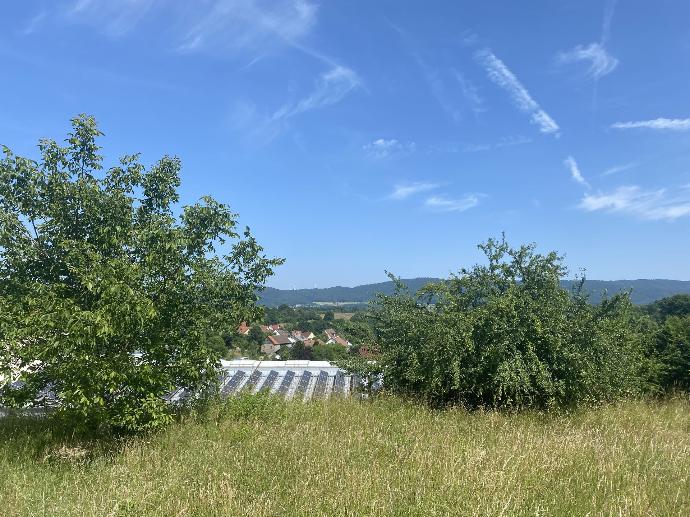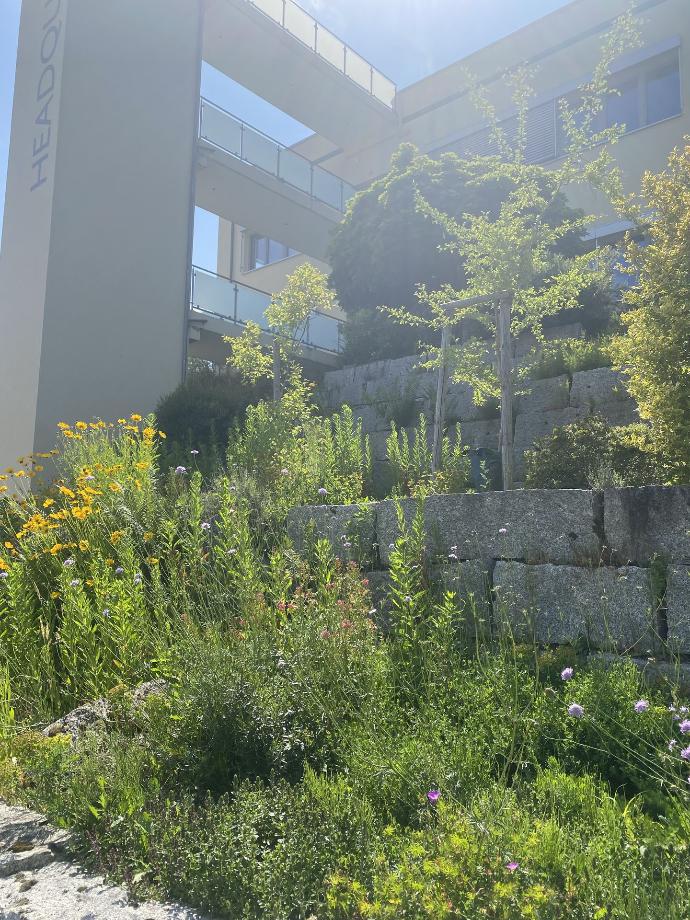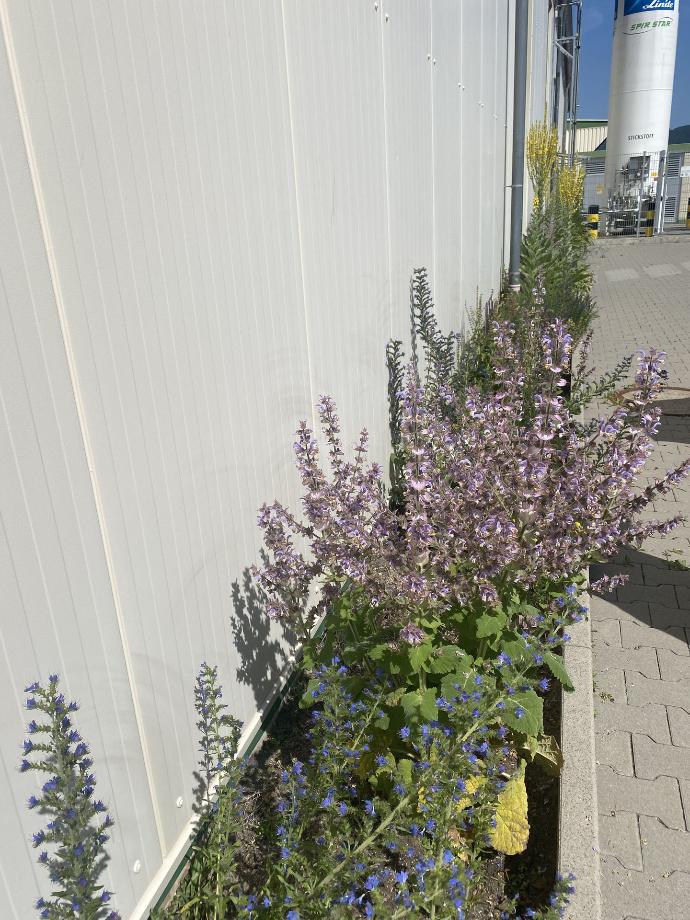The company SPIR STAR ® located in the municipality of Rimbach in the Odenwald region in Hesse has implemented a number of measures to make their company grounds semi-natural: Forage areas and living spaces were created and are maintained for a number of animal and plant species. Further measures include meadows with sheep and an orchard, a small stream and cisterns, but also using deadwood, piles of stones and a basin for amphibians.
Pictures © Climate Alliance
The initiative for developing a near-natural company premises came from the company's CEO, Ruben de Graaf, who believes that entrepreneurs also have a particular responsibility for the environment and that creating habitats for domestic animals and plants is one of the most essential issues for the future.
Even though the measures came with costs for the company, SPIR STAR ® has profited from them in many ways: On the one hand, it gave them a lot of attention and publicity – without them having to take any further initiative. On the other hand, the company based in Hesse says that lack of professionals is not an issue for them: They are able to fill empty positions quickly, and believe that their semi-natural premises and dedication to biological diversity gives them an edge in comparison to their competitors.
For their commitment and effort, SPIR STAR ® was awarded „silver“ as part of the federal program for biological diversity “Thousand gardens – thousand species”. SPIR STAR ® has also produced a series intent on showing the consequences of climate change in the Odenwald region and how people, companies and nature are reacting: the newest episode can be viewed here.
IB-Green spoke with Sabine Steinmann, Environmental Management
Officer at SPIR STAR
®
, on the measures the company has implemented and what
others can learn from their experiences.
Sabine Steinmann, SPIR STAR®: The creation of various small biotopes and habitats. This includes establishing wild perennial flower beds, sowing native seeds, planting orchard trees with traditional apple tree species and bringing in elements like a deadwood hedge (Benjes hedge). We are especially proud of involving our employees through yearly activities together with experts in this field. We want these activities to lead to a knowledge transfer, as well as more awareness regarding biodiversity.
Sabine Steinmann, SPIR STAR®: Even a near-natural company site requires continuous care. Non-native plants occasionally spread and trimming back bramble hedges is essential. Additionally, an advisor from the Heinz Sielmann Foundation wrote her thesis for training to become a natural garden professional with a focus on parts of our company grounds. Building on this, we will implement further near-natural measures in a garden area belonging to one of the office buildings.
Sabine Steinmann, SPIR STAR®: We are in regular exchange with our municipality. For example, we participate in various municipal projects like the "Walnut Project," where we planted several walnut trees together and also communicated on this initiative internally. In addition, every employee can take part in an annual group order through the municipality to obtain fruit trees, as long as these are planted within the municipality's territory. The municipality's environmental expert regularly visits us to help with tasks like pruning our orchard trees.
Sabine Steinmann, SPIR STAR®: Initially,
it was difficult for us to find a landscaping company that works in a near-natural
way in order to implement our vision together with the Heinz Sielmann
Foundation. After several inquiries, we were lucky to find a great company that
we’ve been working with closely with for five years now. Unfortunately, the creation of semi-natural areas is still barely covered in professional
gardening training. Nowadays, landscaping trainees often join us to gain
hands-on experience.
We also feel the effects of climate change quite strongly. As a result, the search for heat-resilient plants and perennials is becoming increasingly important. There is also one area where we had to sow for several years before we had finally chosen the right plants and shrubs. This is part of the process: Don’t get discouraged, but work with experts to find new approaches until you are successful!
Sabine Steinmann, SPIR STAR®: Definitely bring in experts. We ourselves didn’t have any background in biology or botany. We have been cooperating with the Heinz Sielmann Foundation for five years now and Dr. Martina Koch from the foundation has been supporting us since the beginning. You also need to work with a landscaping company that understands and supports near-natural landscaping.
Internally, it's crucial to get the leadership team on board, to communicate
the topics through various channels, and most importantly, to offer employees
opportunities to participate in hands-on activities.
Biodiversity is the foundation of our lives, and every small contribution
helps. Most important of all: every square meter counts – don’t be afraid and just
get started!
Sabine Steinmann, SPIR STAR®: This depends on the size of the near-natural areas. We have several thousand square meters and now employ a dedicated staff member who is mainly responsible for the outdoor areas.
Sabine Steinmann, SPIR STAR®: Thanks to the open communication and involvement of our staff in our biodiversity projects, we receive a lot of positive feedback from colleagues.
In fact, employees are now even approached about our projects in their private
environment, and they have also generated strong media interest.
Occasionally, I receive photos of insects, plants, etc. from private gardens, asking
for these plants or animals to be identified. I forward these inquiries to the
experts, and of course, the colleagues receive feedback from me. For us this
shows us that their interest has grown significantly.
Sabine Steinmann, SPIR STAR®: At the start
of our cooperation with the Heinz Sielmann Foundation, a regional natural
garden expert conducted an extensive walkthrough of our company premises. This
resulted in a report summarizing the current condition of our green spaces,
including existing plant life and recommended near-natural measures for each
area.
Our grounds were divided into several sections, and we jointly decided which
areas to tackle and in what order.
After this agreement, we contacted our landscaping partner and reviewed the
plans together with the natural garden expert. The ordering of regional plants and seeds is handled by the expert, the
landscaping company, and sometimes by us. Finally, we coordinate the timeline in which the measures are to be
implemented.
Sabine Steinmann, SPIR STAR®: There
should be no doubt about creating near-natural company grounds or implementing
adaptation measures. And as mentioned before: every square meter counts! To promote and protect native plants and animals, it’s essential to create
suitable habitats for them.
Biodiversity is the foundation of life and so called “ecosystem services” are also economically significant for us. For instance, we should remember that a large portion of our food and medicine comes from plants, and we need clean air to breathe and access to safe drinking water.
Due to global warming, features like green roofs, façade greening and infiltration areas are becoming increasingly important to make our urban spaces more resilient.


